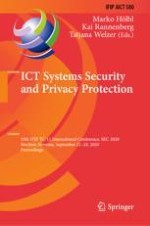2020 | OriginalPaper | Buchkapitel
Assisting Users to Create Stronger Passwords Using ContextBased MicroTraining
verfasst von : Joakim Kävrestad, Marcus Nohlberg
Erschienen in: ICT Systems Security and Privacy Protection
Aktivieren Sie unsere intelligente Suche, um passende Fachinhalte oder Patente zu finden.
Wählen Sie Textabschnitte aus um mit Künstlicher Intelligenz passenden Patente zu finden. powered by
Markieren Sie Textabschnitte, um KI-gestützt weitere passende Inhalte zu finden. powered by
